Memoir of Richard Roberts, 1914-1918































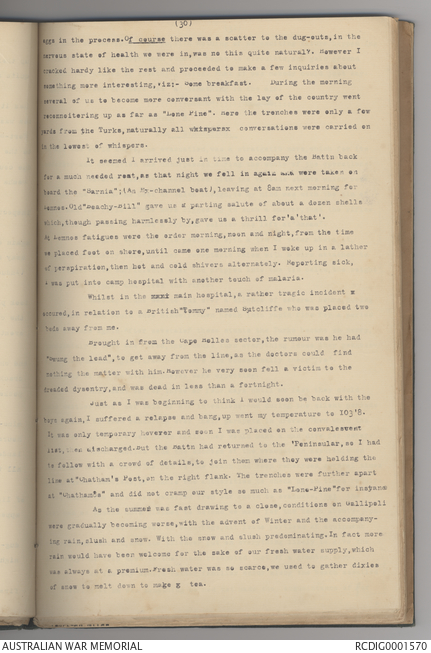
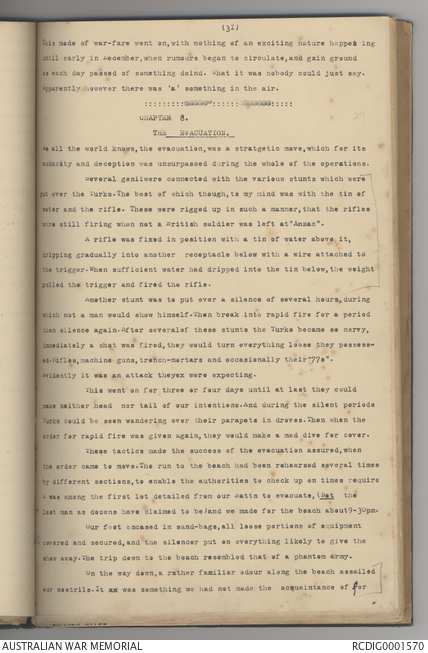













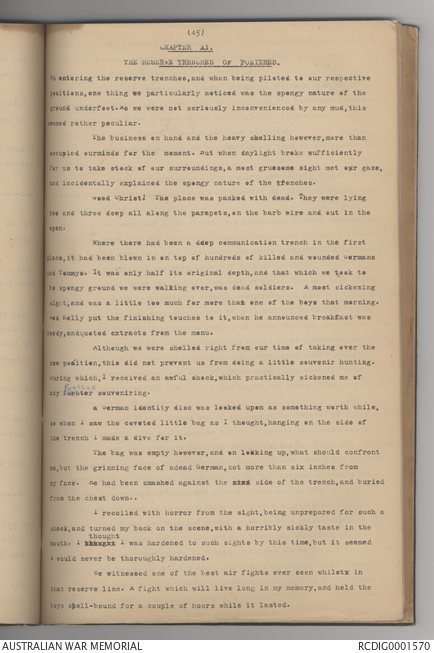










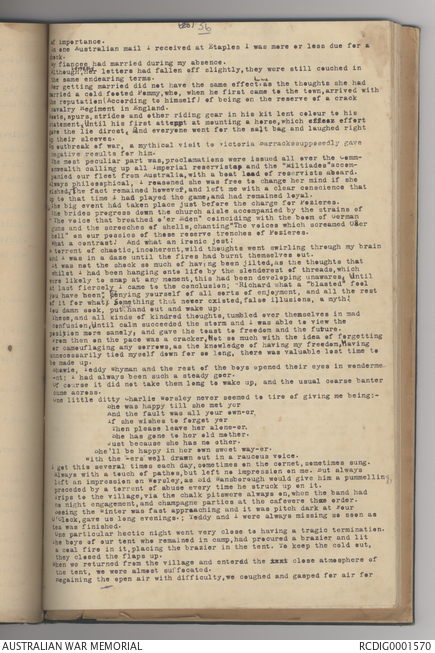





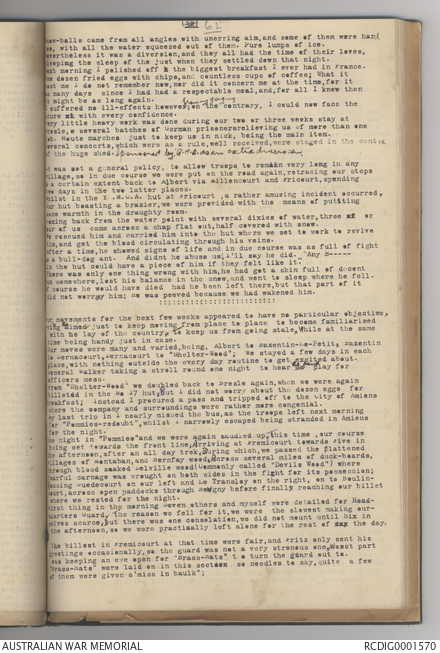
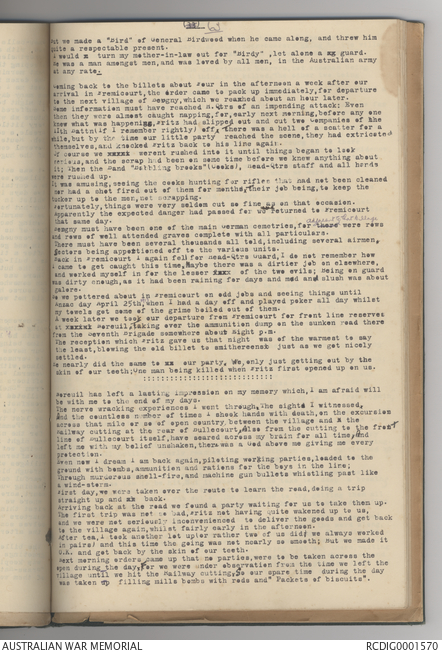




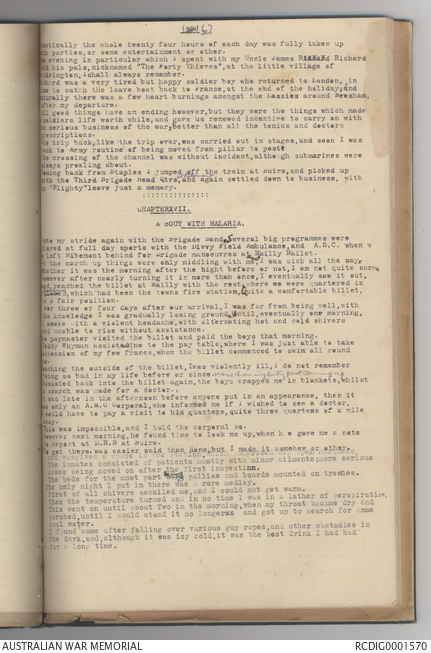

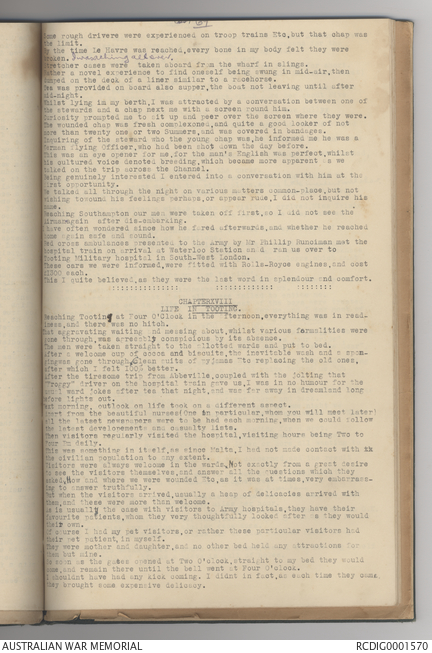
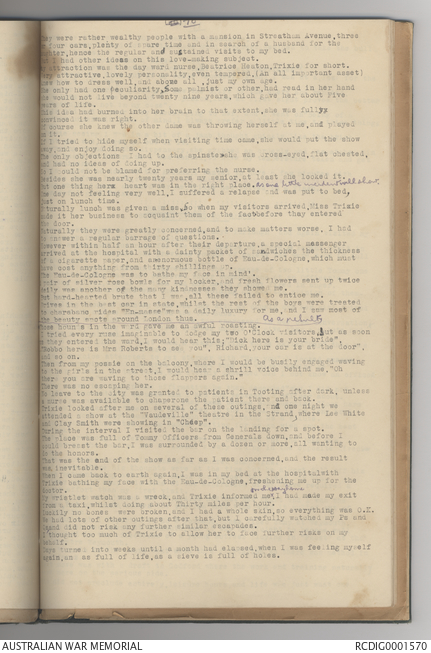










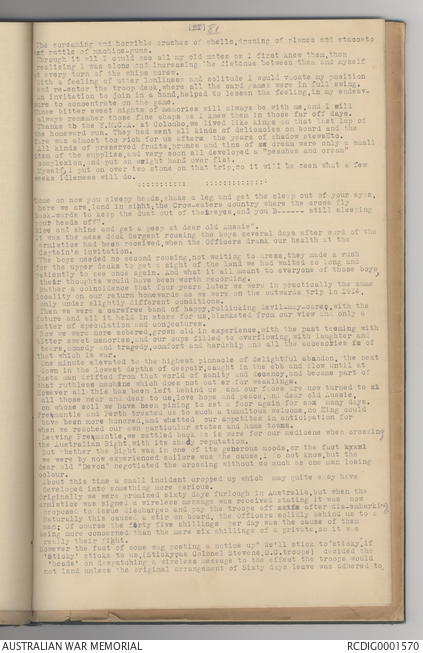






Memoir relating to the First World War service of 773 Private Richard Roberts, 3rd Battalion. In this memoir of his service compiled in 1935, Roberts documents the period from his enlistment and embarkation in 1914 to his return to Australia in 1918.
Roberts, living at Narrabri at the time, begins by describing his enlistment and subsequent camp life at Kensington. He writes that he and his two best friends, 761 Private Albert Edward Meggy and 755 Private William Herbert Newbury, had been placed together in “D” Company of the 3rd Battalion. While in camp, Roberts writes of the personalities of his superior officers and fellow soldiers. After embarking from Sydney on 20 October 1914, he writes of the troopship journey aboard the S.S. Euripides as part of the first convoy of the Australian contingent, recording significant events such as the encounter between H.M.A.S. Sydney and S.M.S. Emden.
After arriving in Egypt, Roberts describes life in camp at Mena, providing several anecdotes such as how the men would pinch hairs from his moustache because of how he would react. He writes of the training the men undertook, including mock battles in the desert, in preparation for their deployment to Gallipoli. In early April the men are kitted up and organised, and Roberts writes of the journey aboard the S.S. Derflinger (Huntsgreen) to Lemnos and then Gallipoli. He provides a detailed account of the landing, he himself nearly drowning after stepping off the landing boat, and sticking close to his mate Newbury throughout the action. Roberts is wounded in the thigh during the advance and writes of being evacuated to the hospital ship “Clan McGillvray” where he recalls the cries and chaos aboard as overworked and under-resourced medical staff tried to treat the wounded. After being sent to Malta, he writes of returning to the 3rd Battalion at Gallipoli only two days before the Turkish attack of 19 May 1915. Roberts remarks upon the death of several men that he knew, but writes that Newbury and Meggy were still alive. He writes of being seriously wounded in the right shoulder on 19 May and being sent to Malta where he was subject to great treatment by the Maltese and the British. It is here, Roberts writes, that he fell in love with nurse Edith Stevenson, and eventually learns of the deaths of his mates Newbury and Meggy at Lone Pine on 6 August 1915. After returning to Gallipoli for a third time, Roberts writes of moving into the line with the 3rd Battalion at Chatham’s Post and subsequently taking part in the evacuation.
After returning to Egypt, Roberts writes of the expansion of the AIF, he himself remaining with the 3rd Battalion but having lost most of his mates at Gallipoli. While in Egypt, he writes of joining the Battalion ban, practice sessions and winning competitions for most improved. The men are sent to France in April 1916, and Roberts writes of the journey north towards the Western Front, the band being temporarily broken up as they were neared the front and Roberts returning to “C” Coy. Initially placed in a the quiet Bois Grenier sector for several weeks, he writes of building parapets and observation posts, laying barbed wire, bringing up stakes and ammunition, and patrolling no man’s land at night. Roberts writes that while out of the line the band would reform, putting down its instruments whenever they headed back into the line. After a brief period around Fleurbaix, the Battalion marches down to Albert where Roberts writes of moving into the reserve trenches at Pozieres, walking on dead British and German soldiers in the half collapsed trenches. He writes of the hellish German artillery fire without any ability of the Australian soldiers to retaliate, the deaths of individuals in the bombardment, and the shattering of nerves. Roberts recalls the attack during the early morning of 23 July 1916 that took Pozieres, the German artillery bombardment making life hell for the Australians trying to dig in. He writes of life in the line at Pozieres, including the bomb fighting, and of being wounded from a shell several days after the initial attack. After being evacuated to No. 11 Stationary Hospital suffering from shellshock, Roberts writes of joining a band at the hospital and his recovery. It is around this time that he learns that his fiancée back in Australia had married while he was at Pozieres. Roberts is discharged and sent to the Australian Divisional Base Depot at Etaples where he is allotted to 3rd Battalion Headquarters. The closing weeks of 1916 see Roberts writing of the winter snow and snowball fights near Albert.
In May 1917, Roberts writes of taking leave to the UK, in particular his sightseeing in London. After returning to France, he is once again hospitalised, this time with malaria, and sent back to the UK in July. Roberts writes of his time at Tooting Military Hospital, including the nurses and local visitors, and of a conversation with shot down German flying officer. After being discharged, he writes of spending two weeks with family in the north of England before entering No. 2 Command Depot at Codford and then the Overseas Training Brigade at Longbridge Deverill. Roberts writes of returning to France in November, first entering camp at Le Havre before re-joining the 3rd Battalion. Upon returning, he writes of learning that many of his mates had been killed at Passchendaele. Roberts once again re-joins the Battalion band.
In March 1918, Roberts writes of moving down to Amiens to counter the German Spring Offensive and the fighting at Strazeele. It is around this time that he notes the death of Jack Burke, an original 3rd Battalion man. Roberts continues to write of his ongoing participation in the fighting and the role of the 3rd Battalion in the fighting in August and September. Having qualified for “1914 Leave”, Roberts returns for Australia in September, and writes of the journey home aboard the “Devon”, recalling mates and experiences. In his final chapter he refers to his obtaining his discharge and his life after service.
Included are several photographic negatives of various unknown buildings.
Share this page
Related information
Events
- German Spring Offensive
- The Turkish attack of 19 May 1915
- Battle of Pozieres
- Albert, 1918
- Amiens
- Anzac
- Bullecourt
- Defence of Anzac
- France and Flanders, 1916-18
- Gallipoli, 1915
- Landing at Anzac
- Pozières
- Somme, 1916, '18
- The landing at ANZAC Cove
- Western Front
- Evacuation of Anzac
- Action between HMAS Sydney and SMS Emden
Units
Places
- Africa: Egypt, Alexandria
- Africa: Egypt, Cairo
- Africa: Egypt, North Egypt, Mena
- Africa: Egypt, North Egypt, Tel el Kebir
- Europe: Belgium, Flanders, West-Vlaanderen, Passchendaele
- Europe: France, Haute-Normandie, Seine Maritime, Le Havre
- Europe: France, Nord Pas de Calais, Nord, Lille, Bois-Grenier
- Europe: France, Nord Pas de Calais, Nord, Strazeele
- Europe: France, Nord Pas de Calais, Pas de Calais, Bethune, Fleurbaix
- Europe: France, Nord Pas de Calais, Pas de Calais, Etaples
- Europe: France, Nord Pas de Calais, Pas de Calais, Sailly-sur-la-Lys
- Europe: France, Picardie, Somme, Albert
- Europe: France, Picardie, Somme, Albert Bapaume Area, Pozieres Area, Pozieres
- Europe: France, Picardie, Somme, Amiens
- Europe: France, Picardie, Somme, Bapaume Cambrai Area, Bullecourt
- Europe: France, Picardie, Somme, Corbie Albert Area, Morlancourt
- Europe: France, Picardie, Somme, Mont St Quentin
- Europe: France, Picardie, Somme, Peronne
- Europe: Greece, Aegean Islands, Lemnos
- Europe: United Kingdom, England, Greater London, London
- Europe: United Kingdom, England, Greater London, London, Wandsworth, Tooting
- Europe: United Kingdom, England, Wiltshire, Codford
- Europe: United Kingdom, England, Wiltshire, Longbridge Deverill
- Mediterranean: Malta
- Mediterranean: Malta, Imtarfa
- Mediterranean: Malta, Malta (island), Valletta
- Middle East: Ottoman Empire, Turkey, Dardanelles, Gallipoli, Anzac Area (Gallipoli)
- Middle East: Ottoman Empire, Turkey, Dardanelles, Gallipoli, Bolton's Ridge, Poppy Valley, Chatham's Post
- Oceania: Australia, New South Wales, Armidale
- Oceania: Australia, New South Wales, Narrabri
- Oceania: Australia, New South Wales, Sydney, Kensington
Subjects
- Billets
- Bombs
- Camp life
- Cattle
- Cold weather
- Concert
- Convalescent services
- Desert operations
- Enlistment
- Fatigue duty (Fatigue)
- Fiancee
- Fortifications
- HMAT Ascanius A11
- HMAT Clan McGillivray A46
- HMAT Euripides A14
- Hospital ships
- Leave
- Love
- Malaria
- Moustaches
- Mumps
- Nurses
- Parades
- Patrols
- Railways
- Route marches
- Rum
- SMS Emden (1908)
- SS Huntsgreen
- Seasickness
- Shellshock
- Sightseeing
- Swords
- Tobacco products
- Training
- Trenches
- Vermin control
People
- Kelly, Charles Edward
- Annetts, John Alfred Henry
- Phipps, William Benjamin
- Newbury, William Herbert
- Meggy, Albert Edward
- Bourke, John James
- Sands, John Page
- Cadell, Thomas Leonard
- Price, Andrew
- Fleming, George Ray
- Bourke, Charles
- Harris, Herbert Thomas
- Vile, Percy Edgar
- Vile, Alfred Ernest
- Burrett, Athol Frederick
- Moore, Donald Ticehurst
- Shooter, Harry
- Little, Arthur John
- Roberts, Richard
- Etchell, William Henry
- Wilson, John Carandini